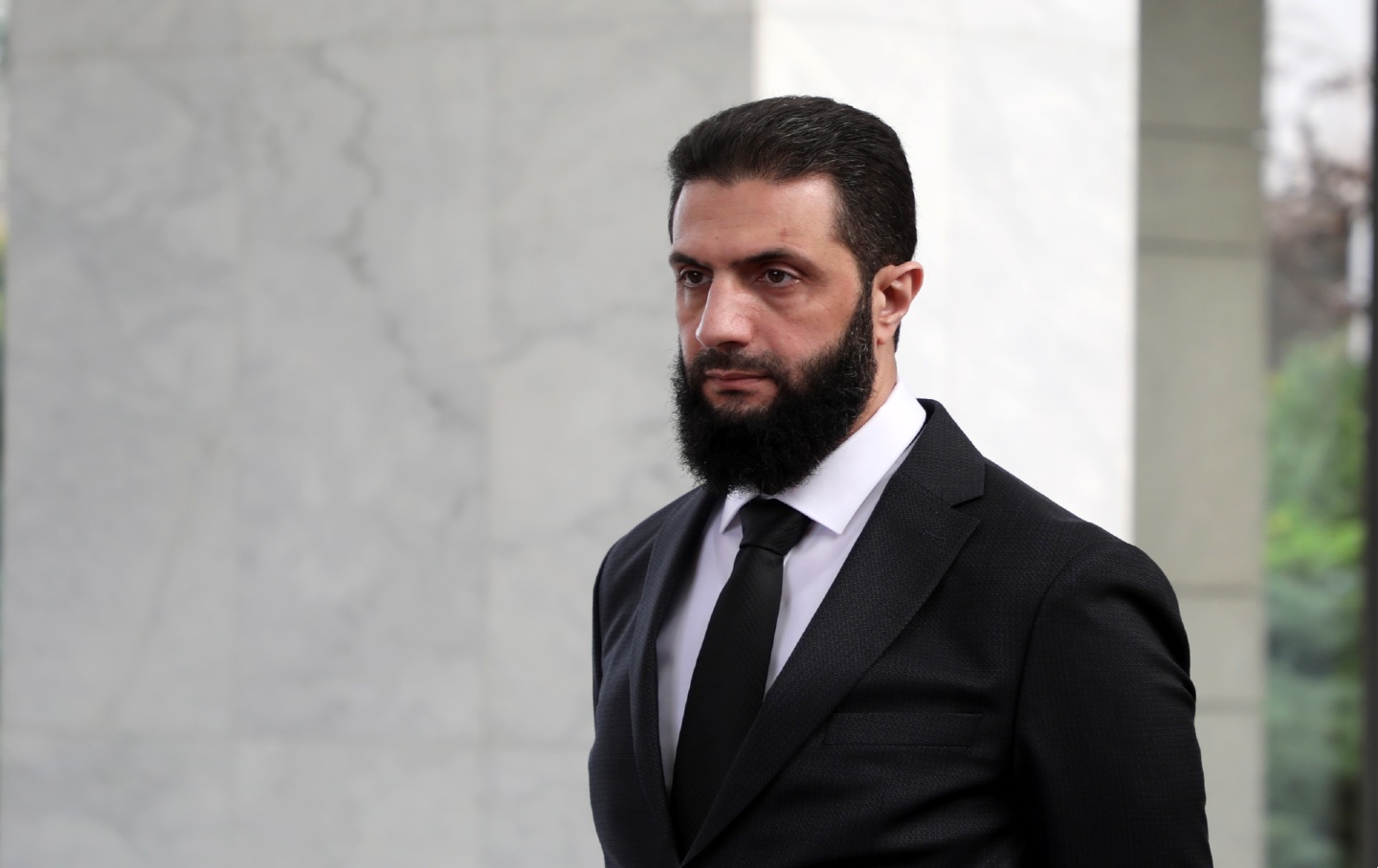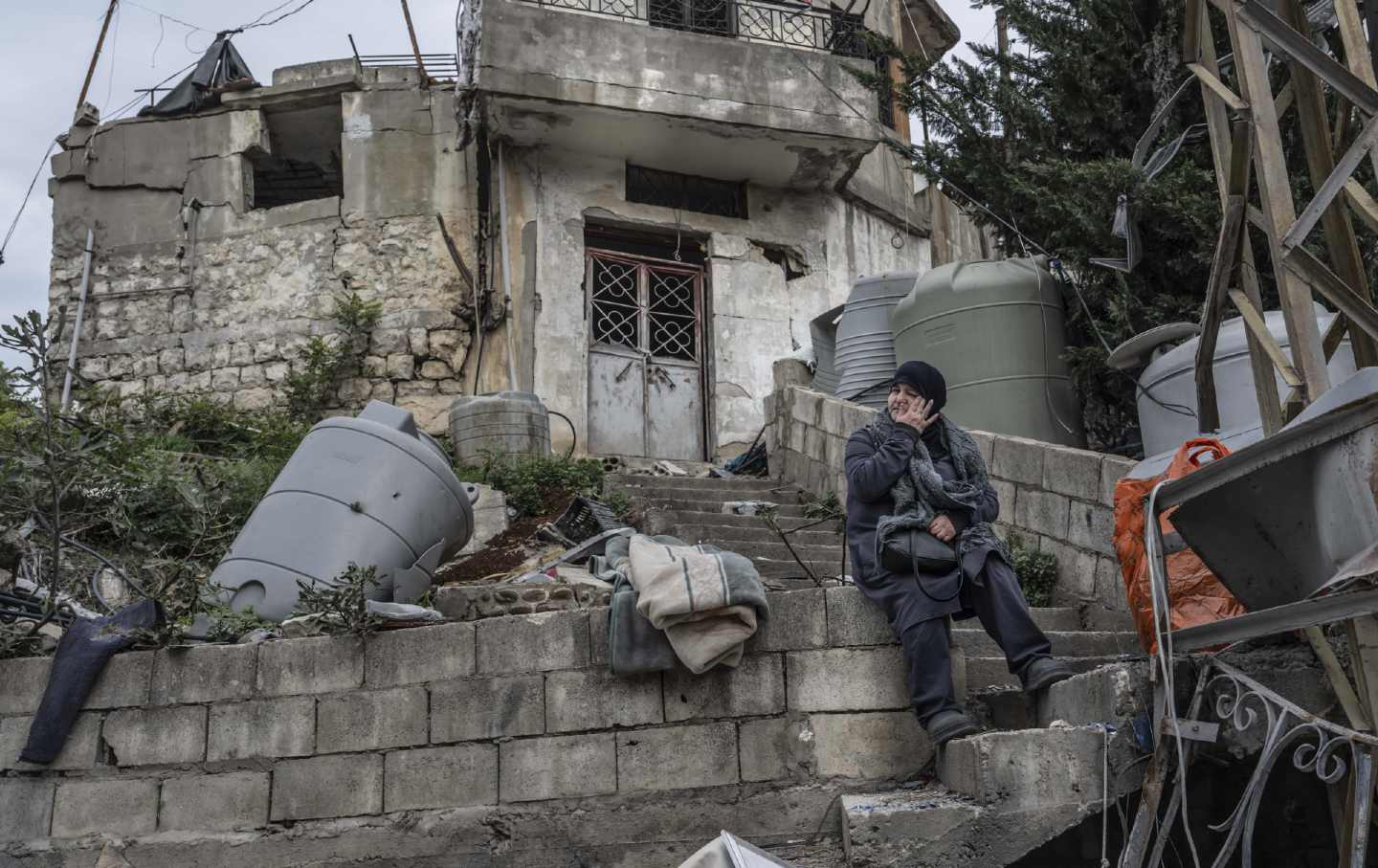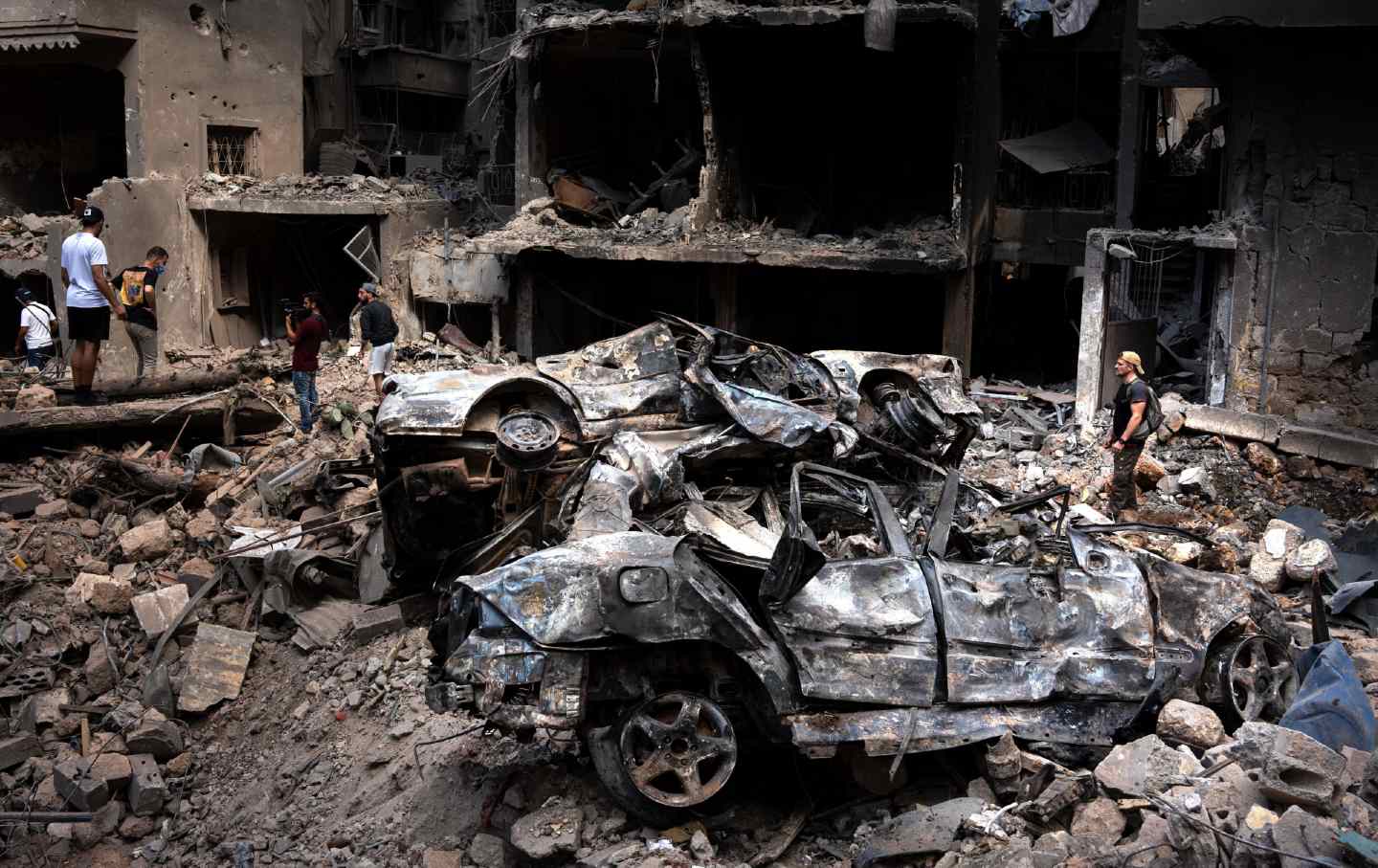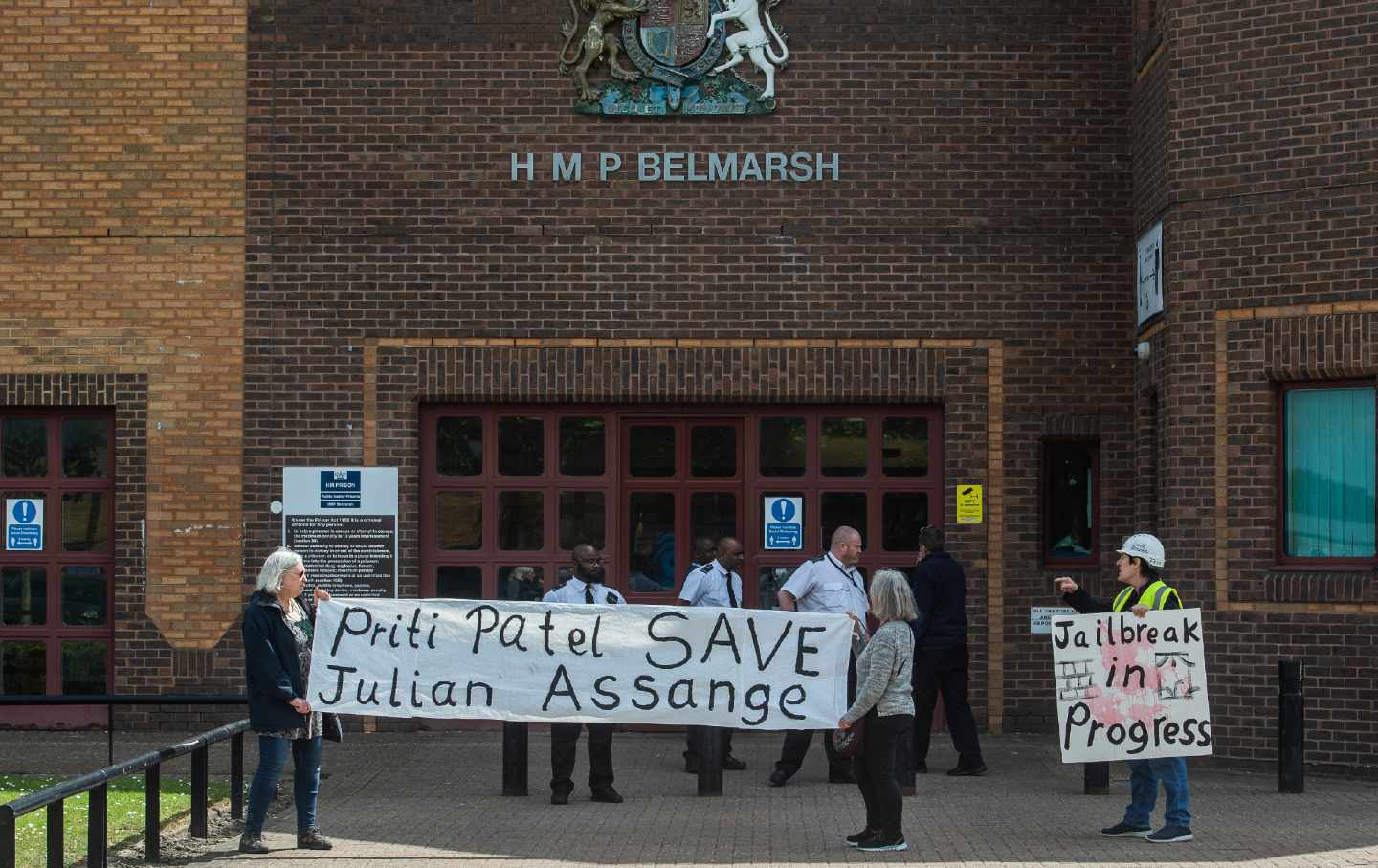Syria’s New Rulers Get a Makeover
The country’s new leader, Ahmed al-Shara, has donned a suit, trimmed his beard, and dropped his nom de guerre. But Syrians are still afraid.

The messages started appearing on my phone as soon as I left Syria in mid-January. At first, there were links to articles, and social media posts, about threats to Alawis and Christians. Then came friends’ accounts of scary incidents. One woman wrote that a police officer from the new government ordered her to cover her hair. Another told me a Sunni friend—a friend—threatened to kill her. A Christian businessman I’ve known for years texted that he would no longer send me anything political via WhatsApp, because the new government was watching.
The atmosphere was already changing from what I had observed at the beginning of the Hayat Tahrir al-Sham (HTS) government under its leader, Ahmed al-Shara. Shara had dropped his nom de guerre, Abu Mohammad al-Jolani, along with the battle fatigues from his years leading Sunni Muslim fundamentalists against the regime of Bashar al-Assad. With a trimmed beard and a new suit, he was receiving and visiting fellow heads of state from the Middle East and beyond. An American delegation was so impressed that the US revoked its $10 million bounty on Shara’s head for terrorist crimes.
I saw Christians celebrating Christmas as always with Masses, concerts, parties, and processions through the old city. HTS’s new governor of Damascus, Maher Marwan, promenaded through the Christian Quarter on Christmas Eve with reassurances that no one would interfere with their religious practices. Restaurants served alcohol, and HTS has so far not ordered women to hide their hair. Yet even then, some of my Syrian friends—and I am fortunate to have many from more than 50 years of visiting their country—said they were afraid, less of the present than of the past and the future.
In the group’s previous incarnations as part of Al Qaeda and the Islamic State, HTS members rampaged through Iraq and Syria from 2014 to 2017, showing no respect for ethnic or religious differences. Its militants massacred Alawis, Christians, and Yazidis. The assault on the Yazidis, whose men they slaughtered and whose women they sold into sex slavery, was genocidal by any standard. HTS militants had expelled Syrian Kurds, although mostly Sunnis, from their ancestral villages in Afrin province and attacked their autonomous region in the northeast. Jihadi propaganda branded Christians and non-Sunni Muslims—Shia, Alawi, Ismaili, and Druze—as “kafirs” (infidels) deserving death. Sunni fundamentalist clerics had preached in the mosques that it was legitimate to murder kafirs and rape their women.
The question was whether that past was truly past. Were Shara’s pious words about including all of Syria’s communities in the new order genuine—or a mask to obtain the foreign funding necessary to reconstruct a country devastated from 2011 to 2024 by savage warfare and economic sanctions? One answer came on March 6, when armed Alawis ambushed “HTS-affiliated” forces in the Alawi-majority region around the coastal cities of Tartus and Latakia. Some media reports identified the attackers as “Assad loyalists,” as if their coreligionist Assad planned to regain his throne rather than settle into peaceful luxury in Moscow. A friend of mine in Tartus said the Alawis who took up arms were hungry. Like the rest of the 100,000 Alawis who were dismissed from the army and other government service, they had no incomes and blamed HTS for impoverishing their already destitute community.
John Sawers, a former chief of Britain’s MI6 intelligence service, noted in the Financial Times that Shara “unwisely disbanded the old Syrian national army and police services—repeating the painful mistakes the Americans made in Iraq after the fall of Saddam Hussein’s regime.” Just as disgruntled former Iraqi soldiers constituted the original nucleus of anti-occupation resistance in Iraq after 2003, demobilized Alawis began to rebel against HTS and allied gunmen patrolling their villages.
The backlash against the March 6 attack was as swift as it was vicious. CNN documented an assault the next day on the Alawi village of Sanobar that left 200 villagers dead. The CNN journalists wrote that “government-aligned forces subjected largely unarmed villagers to summary executions, looting, arson and sectarian slurs, and bodies were piled up in two mass graves.” More massacres followed during what the Associated Press called “among the bloodiest 72 hours in Syria’s modern history, including the 14 years of civil war.” Reuters correspondents “saw many homes and shops torched and looted, and villages largely deserted, during a visit to the area on [March 13].” The Syrian Observatory for Human Rights (SOHR) wrote on March 10 that it “has documented the death of 973 civilians in recent days, all of whom were executed and killed in cold blood.”
SOHR, the leading organization exposing the Assad regime’s crimes during the civil war, condemned a media campaign to intimidate Alawis: “SOHR confirms that the objective of this media campaign is manifested in obliterating evidence of the mass genocide against [Alawis] in the Syrian coastline [to] reshape the genocide [as] a sectarian conflict; this, in turn, reduces potential for blaming ruling authorities for those crimes.”
Alawi students at university have received death threats on social media from their classmates. One Alawi woman I know sent me an urgent message:
It is a massacre. 52 were killed in the same village in Latakia. Some people make mistake. We pay the bill. Watch [a video of bloodied corpses beside the road]…All of them are doctors. They were killed in Baniyas. Killing everywhere.
A day later, she sent another message:
They consider us disbelievers. We must be killed. Today my friend told me that Allah will hang me from my hair so I must cover my head. We were good friends. How did they change their ideas?
She asked me to help her daughter, a medical student, obtain a visa for any country that would take her. Christians, observing the Alawis’ fate, have sent similar pleas for help. They, too, fear being killed or forced to live under strict Islamic fundamentalist laws so much that they long to emigrate from the country where their communities have lived since Ananias baptized St. Paul in Damascus.
The jihadis, not unlike Israeli soldiers in Gaza, posted videos of themselves proudly committing war crimes. One sang that he was engaging in “ethnic cleansing.” Shara, whose followers took part, promised an investigation—much as the Israeli prime minister said the IDF would investigate itself for alleged criminal behavior.
Three hundred miles south along the Mediterranean shore from Syria’s Alawi heartland, another, larger genocide is underway in Gaza. The perpetrators are allowed to judge themselves, while a quiescent world ignores its obligation under the 1951 Genocide Convention “to prevent and to punish” actions calculated to cause any people’s “physical destruction in whole or in part.”
Hold the powerful to account by supporting The Nation
The chaos and cruelty of the Trump administration reaches new lows each week.
Trump’s catastrophic “Liberation Day” has wreaked havoc on the world economy and set up yet another constitutional crisis at home. Plainclothes officers continue to abduct university students off the streets. So-called “enemy aliens” are flown abroad to a mega prison against the orders of the courts. And Signalgate promises to be the first of many incompetence scandals that expose the brutal violence at the core of the American empire.
At a time when elite universities, powerful law firms, and influential media outlets are capitulating to Trump’s intimidation, The Nation is more determined than ever before to hold the powerful to account.
In just the last month, we’ve published reporting on how Trump outsources his mass deportation agenda to other countries, exposed the administration’s appeal to obscure laws to carry out its repressive agenda, and amplified the voices of brave student activists targeted by universities.
We also continue to tell the stories of those who fight back against Trump and Musk, whether on the streets in growing protest movements, in town halls across the country, or in critical state elections—like Wisconsin’s recent state Supreme Court race—that provide a model for resisting Trumpism and prove that Musk can’t buy our democracy.
This is the journalism that matters in 2025. But we can’t do this without you. As a reader-supported publication, we rely on the support of generous donors. Please, help make our essential independent journalism possible with a donation today.
In solidarity,
The Editors
The Nation








